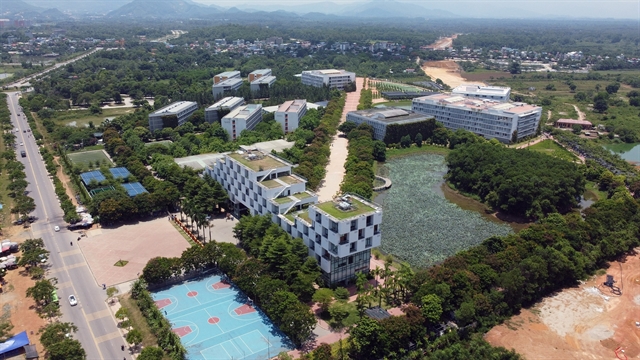 Economy
Economy

 |
| A view of FPT campus in Hoà Lạc Hi-tech Park. Vietnamese Government has introduced incentives to encourage investments in the development of high tech parks. — VNA/VNS Photo Huy Hùng |
HÀ NỘI — The Vietnamese Government has introduced incentives to encourage investments in the development of hi-tech parks.
Coming into effect from March 25, Decree 10/2024/NĐ-CP regulates that hi-tech parks will be eligible for investment incentives equivalent to those applied to localities with extremely difficult socioeconomic conditions.
The incentives of corporate income tax, export-import taxes, land fees and credit will be implemented following the established regulations on investment.
Accordingly, investments in hi-tech parks will enjoy a corporate income tax at 10 per cent per year for 15 years. Exemption will be given for the first four years and a reduction of 50 per cent for nine consecutive years.
Projects in hi-tech parks will also be prioritised for participation in support programmes on training and recruitment, while receiving support for research and development, hi-technology application, technology transfer, hi-tech agriculture and innovations.
The new decree also paves the way for private investors to participate in developing the technical and social infrastructure system for hi-tech parks.
There must be planning of housing and social infrastructure with good connectivity to hi-tech parks to serve people working in the hi-tech zones.
The social infrastructure system also includes cultural works, parks, gardens, green spaces and recreation complexes for public use.
Investments from the State budget and official development assistance will prioritise the development of research centres, large-scale international standard labs, high-tech incubators, training centres and information infrastructure.
The existing hi-tech parks can be expanded if their occupancy rate is 60 per cent or higher.
The new decree is expected to push the development of hi-tech parks which are losing momentum due to limitations in mechanisms.
In the context of Industry 4.0 with rapid changes taking place in the world and domestic market and the Vietnamese Government’s orientation that science and technology is the most important impetus for modern production, the development of hi–tech parks is critical to promote the implementation of science and technology, according to researchers from the Việt Nam Economics Institute.
Researchers say that human resources for innovation is a very important factor.
According to Hoà Lạc Hi-tech Park’s Management Board, it is necessary to have favourable policies on personal income tax and long-stay visa for experts working in hi-tech parks.
The Management Board of Đà Nẵng Hi-tech Park said that in the long term, a separate law on high tech zones should be developed to promote their development.
Currently, there are three hi-tech parks in Việt Nam, one in HCM City, one in Hoà Lạc, Hà Nội and one in Đà Nẵng.
HCM City Hi-tech Park, founded two decades ago, has attracted 160 projects with a total investment of US$12 billion.
Đà Nẵng Hi-tech Park, established in 2010, has attracted 26 projects with a total investment of $852 million.
Hoà Lạc Hi-tech Park, founded in 1998, covering around 1,600 hectares in Thạch Thất and Quốc Oai districts, has attracted 102 projects with a total registered capital of $4.04 billion). The park draws big tech companies such as Viettel, FPT, Hanwha Aerospace and Nidec. — VNS